Recognition of managers behind future success of statewide mobility management networks

Statewide mobility management networks can play a more vital role serving the transportation needs of all citizens because the men and women who manage these systems are gaining recognition for the value and significance of their work.
That is a key finding from “Statewide Mobility Management: Factors Affecting the Creation and Success of Networks,” a research study completed by the Urban Transportation Center at UIC. As noted in the study: “These individuals are often highly visible in their communities as the ‘public face’ of mobility innovation at the state level, and they view the field of mobility management as a growing one.”
Mobility management networks are often perceived as a coordinated effort to offer or improve transportation for people with disabilities, seniors, veterans, and other transit-dependent or underserved members of a community. That concept has evolved in recent years to providing more encompassing travel options for everyone.
Funding was provided by the National Center for Mobility Management and Federal Transit Administration, which also funded a 2019 study, “Mobility Management: State of the States Report.”
UTC researchers conducted one-hour phone interviews with mobility managers from various states around the country to understand the opportunities and challenges they face and compile data on their respective career paths and professional development opportunities. The interviews revealed that mobility managers are passionate about their work and the role improved mobility can play in modern society; furthermore, they are committed to exploring “new and creative resources to fulfill their agency’s or organization’s mission.”
Other findings from the study:
- In the states surveyed, the operation of the network is reliant on the individual transportation professional charged with the task. These dedicated managers bring a wealth of skill and experience, but they often are responsible for implementing the entire statewide program without regular support.
- Currently, there is a lack of documentation, strategic planning and performance measures in the development and management of a statewide mobility management system. The research revealed that those in charge “at times feel isolated from broader transportation planning efforts, as well as from their peers in other states.”
- Three areas were identified to help foster improved and more successful mobility management networks: a) Increasing professionalism through a national certification program, more education, and a formal networking organization to share best practices. b) Building greater awareness among diverse audiences for the role and value of networks. c) Increased state funding for staffing and program development.
The report was led by UTC director Dr. P.S. Sriraj, with support from senior associate Lise Dirks and research assistants Em Hall and Michael McCarthy. Visit this link to read an abstract and access the full report.
The Urban Transportation Center at UIC is dedicated to conducting research and education and providing technical assistance on urban transportation planning, policy, operations, and management. The UTC is part of the College of Urban Planning and Public Affairs, a nationally recognized innovator in education, research, and engagement in support of the nation’s cities and metropolitan areas.
Learn more at www.utc.uic.edu.
